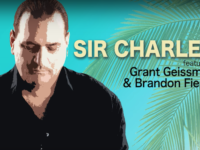Charles Lloyd, the jazz legend hidden in plain sight, is as productive and vibrant coming up on his 75th birthday as he’s ever been. As he reaches an advanced age, he looks not ahead to mortality but back — way back — at his own lineage. Hagar’s Song consists of many graceful readings of jazz standards, a couple of pop ones and a suite Lloyd composed for his great-great-grandmother, who grew up as a slave in the antebellum South. As if to underscore the fragility in the way he wanted to project in this music, he performed it with only his pianist from his current quartet, the sublimely talented Jason Moran.
Perhaps it goes without saying for anyone whose heard Lloyd before, even if only from his signature Forest Flower (1967) album, but he is the extremely rare saxophonist who is recognizable from the first couple of notes, and the tender intimacy of this album that puts that unique essence of his right inside the listener’s ears. On the Billy Strayhorn number “Pretty Girl,” that distinctive way he lyrically rolls his notes gives him away from the opening moments, and so appropriately, Moran has much sensitivity in his delivery of the harmonic lines, as he does on “You’ve Changed,” and really, all over. Lloyd, meanwhile, showcases what is perhaps his greatest strength, taking pretty melodies and making them even more so. Thus, he doesn’t make you sick of Ellington’s “Mood Indigo,” he instead reminds you of why the song is a classic to begin with. On Carl Fischer’s “You’ve Changed,” he doesn’t even really deviate from the original melody; his tone and touch are enough to get by.
Together, though, it’s apparent that Lloyd and Moran have gotten to know each other very well musically. On this fourth album together, they work hand in glove to give each song a gentle elegance with the depth that usually doesn’t come from only two instruments. For both “Bess, You Is My Woman Now” and “All About Ronnie,” they flow together in sync over no defined time signature and for Lloyd’s own “Pictogram,” Moran is responding perfectly to Lloyd’s elusive maneuvers.
So what about the paean to Lloyd’s enslaved ancestor? That’s encapsulated in the five-part “Hagar Suite,” nearly long enough to fill up an album on its own. Lloyd’s bass flute on “Journey Up River” perfectly fits the mental picture of a quiet, majestic river. Moran comes in underneath the flute to form a groove until Lloyd changes the melody in the middle to a kind of tribal ambience and Moran plays tambourine as well as piano. Lloyd goes back on tenor for “Dreams Of White Bluff,” a spare, lonely harmony with a Coltranian spirituality coming out of his horn. Lloyd employs an alto flute for “Alone” as Moran taps out bass notes in a Morse code style. That sets up the increased tension of “Bolivar Blues,” with Lloyd back on his tenor sax and doing some of his most engaging improvising here. “Hagar’s Lullaby” slows down from “Bolivar Blues” into a childlike tune.
Lloyd and Moran conclude the sequence with three covers falling outside the realm of modern jazz. “Rosetta” is an Earl Hines song, and Moran avoids playing full-on stride piano though he hints at it a lot; it’s another example of where he strongly references tradition but avoids mimicking it, preferring to ultimately forge his own path. Lloyd blows a dense cluster of notes at the end of a solo that threatens to veer off into out-jazz just as he was handing off to Moran. “I Shall Be Released” is a Bob Dylan song, but it’s perhaps more closely associated with The Band, as it was on their first record and one of the ending performances of The Last Waltz. Lloyd chose this song in dedication to the just-passed Levon Helm. Here, the melody is close to original but the underlying harmony as performed by Moran is completely overhauled, adding a level of sophistication and nuance to the song. Lloyd’s sax is at times fragile and other times, assured.
And finally, there’s an alluring rendition of the Brian Wilson’s “God Only Knows” (Lloyd appeared on some Beach Boys record in the mid-70s and has had a longtime affinity for Beach Boys songs). Exploiting another timeless pop melody from the 60s, Lloyd is able to transcend jazz to play in a way that anyone can attach to and still sound very much like himself.
Then again, Charles Lloyd can only be himself no matter the setting. Choosing a setting of a one-on-one with his exceptionally refined pianist Jason Moran makes Hagar’s Song yet another strong entry in Lloyd’s late career discography.
Hagar’s Song will be released February 26 by ECM Records.
[amazon_enhanced asin=”B00ARX2WLK” /] [amazon_enhanced asin=”B003NBBNEU” /] [amazon_enhanced asin=”B0012NON7K” /] [amazon_enhanced asin=”B0000033CC” /][amazon_enhanced asin=”B000EGCE9U” /] [amazon_enhanced asin=”B000023Y6C” /] [amazon_enhanced asin=”B003L7JVFY” /] [amazon_enhanced asin=”B0035F0MSC” /] [amazon_enhanced asin=”B000H3097E” /]



